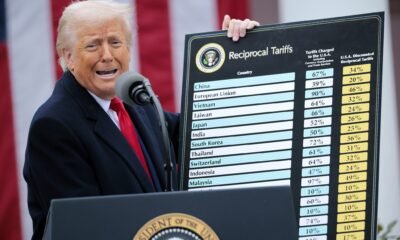courts
Kory Langhofer: Navigating Legal Battles in a Challenging Landscape

Kory Langhofer, founder of the Arizona-based political law firm Statecraft, has witnessed significant changes in political law since he established the firm in 2015. With nearly a decade of experience representing high-profile Republicans at both state and national levels, he reflects on the increasingly adversarial climate within the legal landscape of politics.
Langhofer attributes his journey to a mix of luck and timely suggestions. He began his legal career in New York before moving to Arizona, where he served as a federal prosecutor. After a light-hearted birthday celebration with a friend, he was encouraged to explore opportunities in Republican political law, identifying a gap as many established attorneys transitioned into retirement or judicial positions.
The nature of political law has shifted dramatically, according to Langhofer. He reminisces about a time when legal practice in the political arena was cordial and enjoyable. Now, he contends that it often feels like a grind filled with hostility and personal attacks, particularly in politically polarized states. The change is not only external but also interwoven within the expectations of clients, who increasingly view litigation as a primary strategy over traditional campaigning.
Langhofer identifies the 2020 election as a pivotal moment that soured relations among lawyers on both sides of the political spectrum. Despite the tensions, he notes an unexpected outcome: judges across the country are now more skeptical of political lawsuits, which he believes has restricted access to the courtroom for all but the most exceptional cases.
Experiences of hostility have come with the territory. Langhofer recounts receiving threatening voicemails and bizarre messages, leading him to involve law enforcement in one extreme instance. He jokes about sending the more laughable messages to his family for entertainment, yet acknowledges the underlying anxiety they bring. “I get hate mail from both sides of the aisle,” he observes.
Determining which cases to pursue has become more selective. Langhofer explains that his firm turns away more cases than it accepts, prioritizing long-term client relationships over short-term gains. He emphasizes the need for a reasonable chance of success and material relevance when assessing post-election disputes, seeking to avoid litigation for trivial matters.
Reflecting on what constitutes an effective political attorney, Langhofer insists on the importance of transparently communicating the strengths and weaknesses of a case to the client. He also highlights the “unwritten rules” of legal practice, underscoring the importance of credibility and the totality of circumstances presented to judges.
Looking ahead, Langhofer expresses concerns about the emerging norm of prosecuting political opponents, highlighting that the trend is not limited to any one party. He refers to it as a runaway train and questions the implications it bears for future political engagement, noting that the atmosphere has become increasingly unsafe.
As for his aspirations, Langhofer acknowledges a potential departure from political law if the current contentious environment persists. He has developed a passion for biking as an escape, recently completing a scenic six-week cycling trip along Spain’s Camino de Santiago.
His professional ethos emphasizes the value of disagreement and autonomous thought within his practice. This encourages diverse perspectives, enhancing the quality of legal assessments. Personally, however, he jokes that his guiding principle is simply to make it through each day.


















